-
No-Code
Platform
-
Studio
No-code agentic platform delivering the fastest time-to-value and the highest ROI
-
Studio
-
AI-Native CRM
CRM
-
AI-Native CRM
New era CRM to manage customer & operational workflows
CRM Products -
AI-Native CRM
- Industries
- Customers
- Partners
- About
What is Lead Scoring? The Definitive Guide: Benefits and Examples
Updated on
September 12, 2025
12 min read
Score, Segment, and Nurture in One Flow. Try Creatio

In today's competitive market, identifying and prioritizing potential customers is essential for business success. Lead scoring is a powerful tool that helps businesses evaluate and rank prospects based on their likelihood to convert. Companies can focus their sales and marketing efforts on the most promising opportunities, improving their efficiency, and boosting sales.
In this article, we'll explore how lead scoring works and the different lead scoring models available that can help you optimize your lead management process and achieve business success.
What is Lead Scoring?
Lead scoring is a tool used by businesses to evaluate and rank prospects based on their likelihood of converting into paying customers. The lead scoring process involves assigning values to leads based on various criteria, including demographic information, behavioral data, and engagement levels. The higher the lead score, the more likely the lead is to become a customer.
The primary goal of a lead scoring tool is to prioritize leads so that sales and marketing teams can focus their efforts on the most valuable potential customers who are ready to convert. This ensures that resources are allocated efficiently and high-value leads receive the attention they need to move through the sales funnel.
In essence, lead scoring helps businesses understand their prospects better and make informed decisions about how to engage with them. It transforms raw data into actionable insights, enabling businesses to identify which leads are worth pursuing and which ones require more nurturing. Following the lead scoring best practices, companies can optimize their lead management strategies, and achieve better outcomes in their customer acquisition efforts.
Why is Lead Scoring Important?
The lead scoring process is essential in helping sales teams distinguish between a customer's general interest in products and their actual intent to make a purchase.
For example, if prospects only view a few web pages or download free content, it might indicate they are curious and don’t intend to buy anything. Putting an effort into nurturing these leads might go to waste as they are not ready to purchase.
On the other hand, if prospects request a demo or check out the pricing page, they are more likely to convert and just need a bit more information or convincing. Focusing on them allows marketing and sales teams to prioritize their efforts toward qualified leads and close more deals.
How Lead Scoring Works
Lead scoring involves several key steps to effectively evaluate and prioritize leads. It helps businesses identify and focus on the most promising prospects, ensuring that sales and marketing efforts are directed toward individuals or organizations with the highest potential for conversion.
By analyzing and assigning value to various data points of each lead, companies can streamline their sales processes, optimize resource allocation, and ultimately increase their overall efficiency.
Here's a step-by-step outline of how lead scoring works:
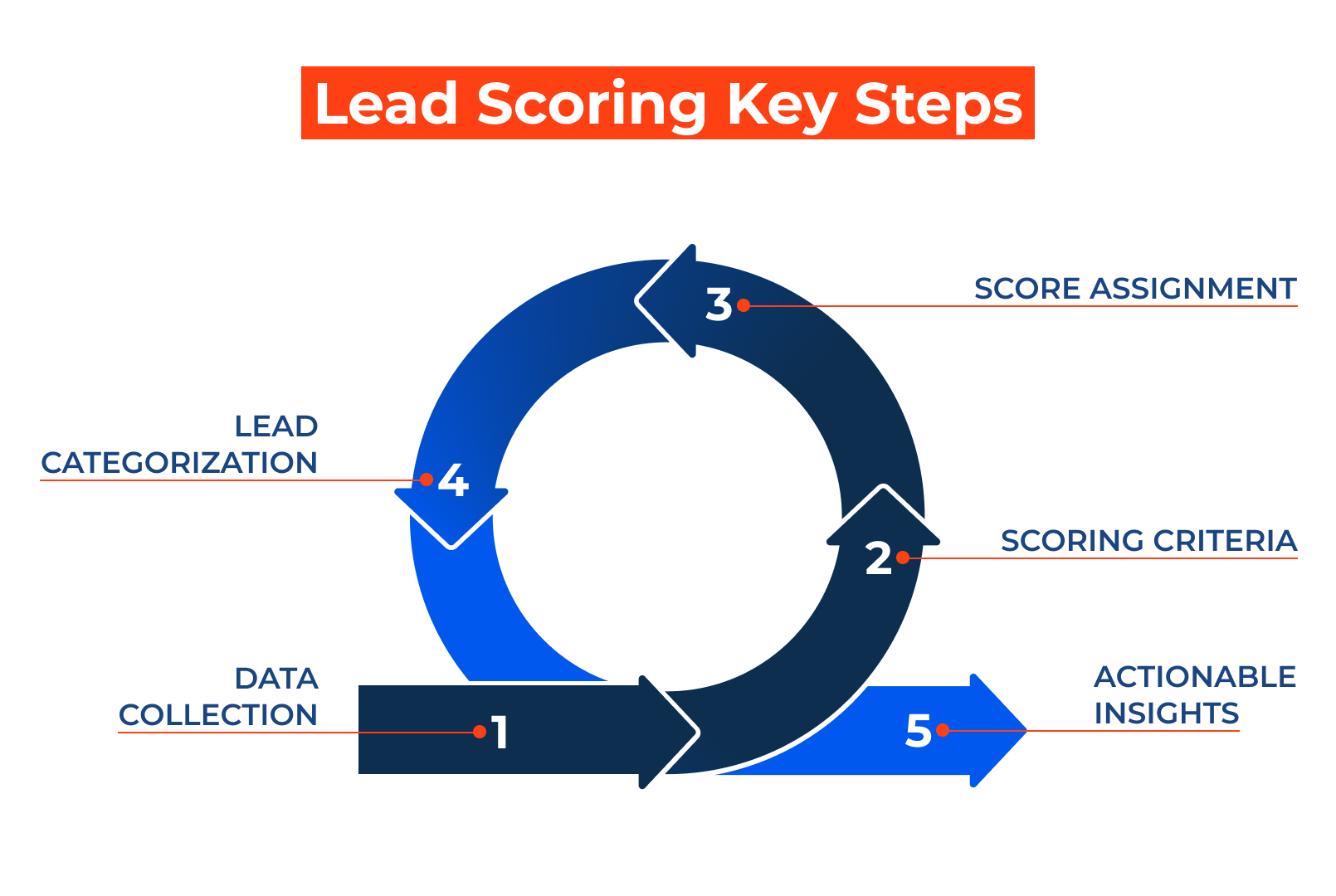
1. Data collection
The first step in lead scoring is gathering relevant data about your leads. This information comes from various sources, including website visits, email interactions, social media engagement, form submissions, etc.
The more comprehensive the data, the better the scoring process. Key data points often include demographic information (such as job title, company size, and industry) and behavioral data (such as pages visited, content downloaded, and email open rates).
2. Scoring criteria
Once the data is collected, the next step in lead scoring is to choose the scoring criteria. This involves determining which characteristics and behaviors are the most important to asses the lead’s potential.
Common criteria include:
- demographic information
- behavioral data
- company data - revenue, number of employees, etc.
- engagement level - frequency and recency of interactions with your brand.
These criteria should be tailored to fit your business model and sales strategy.
3. Score assignment
With the criteria in place, each lead is assigned a score based on how well they meet the established criteria. This can be done manually or through automated lead scoring tools like Creatio CRM that use algorithms to accurately assign points and calculate lead scores.
Lead score points are awarded for positive attributes and behaviors (visiting the pricing page, or opening emails) and may be subtracted for negative ones (long periods of inactivity).
The scoring system can be linear, with simply adding and subtracting points, or more complex, using weighted values to prioritize certain actions or characteristics.
4. Lead categorization
After the lead score is calculated, lead scoring systems assign point values, evaluate the lead quality, and place it into one of the predefined categories.
This lead grading system usually includes:
- hot leads - high-scoring leads that are ready to be passed on to the sales team for immediate follow-up. They have a high potential to convert and with the right strategy can be efficiently moved to the next step in the sales funnel and turned into paying customers.
- warm leads - leads with moderate scores that may require additional nurturing with marketing efforts like personalized email campaigns, targeted content, and social media engagement, to move them further along the sales cycle before they are ready for sales engagement.
- cold leads - low-score leads that are unlikely to convert and may need to be disqualified or re-engaged at a later time.
By focusing sales efforts on prospects with a higher lead score and nurturing those with moderate scores, businesses can ensure that their teams are working on the most promising opportunities, increasing their productivity and effectiveness.
5. Actionable insights
The final step involves using the scores and categorizations to generate actionable insights. These insights prompt the sales and marketing teams to take the next step such as:
- sales follow-up - hot leads are prioritized and should be contacted immediately to ensure high-potential prospects are engaged at the right time.
- marketing nurture campaigns - warm leads are targeted with personalized content and campaigns to nurture them into high-value leads.
- strategy change - continuous analysis of lead scoring data helps refine and adjust marketing and sales strategies over time.
By following these key steps, businesses can optimize their lead management process, improve conversion rates, and enhance overall sales and marketing efficiency.
Lead Scoring Models
Lead scoring models provide various frameworks for evaluating and prioritizing leads based on specific criteria and data points.
Here are several common lead scoring models based on the type of data collected from people who engage with your business:
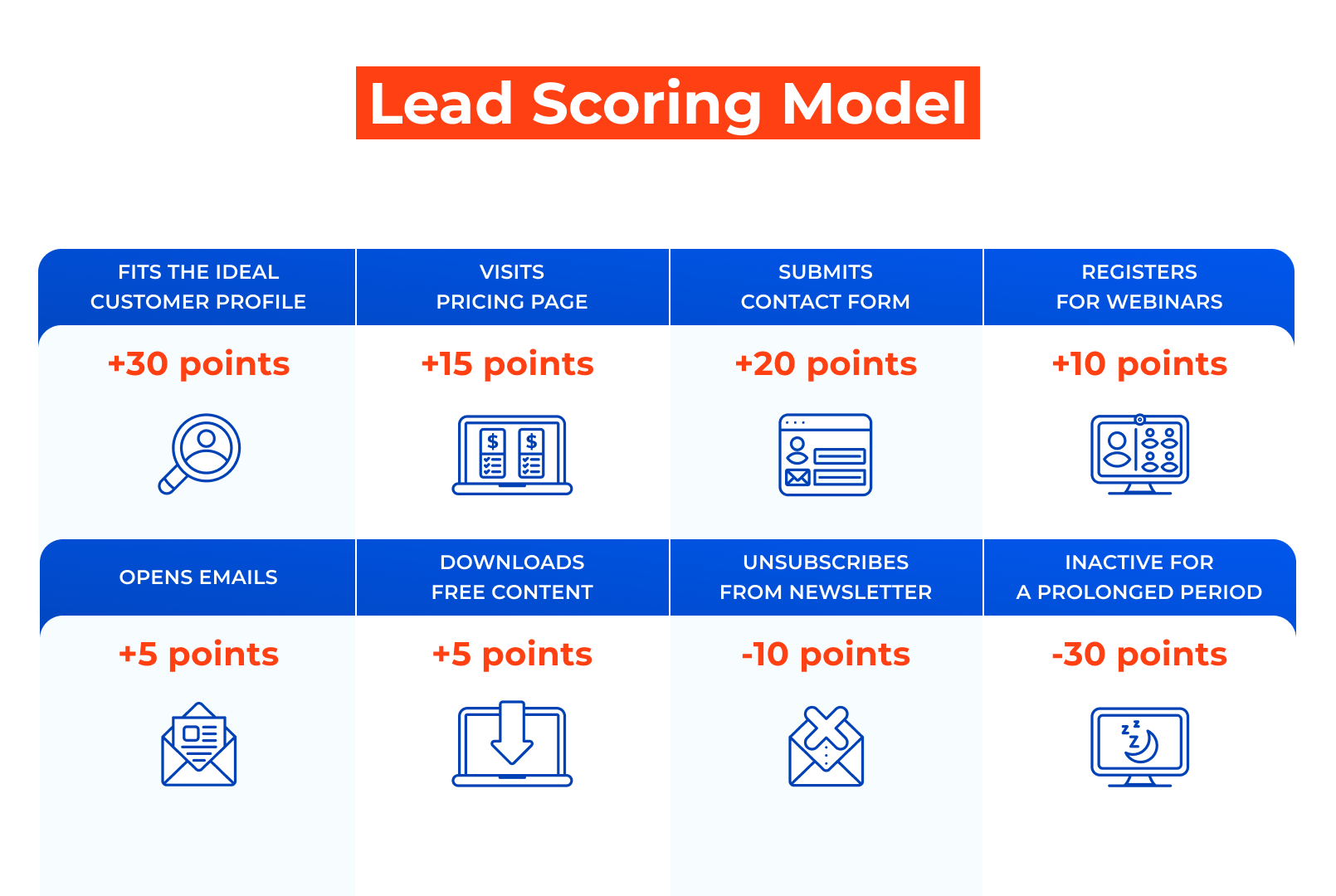
Demographic lead scoring model
This model focuses on the demographic characteristics of leads, such as geographic location, company size, job title, etc. Businesses can analyze these factors to determine how well a lead fits their ideal customer profile and assign appropriate scores to prioritize leads that are more likely to respond to their offer.
For example, a B2B company might prioritize leads from enterprises in specific industries, assigning higher scores to these leads and subtracting points from those that don’t fall into this category.
Behavioral scoring model
The behavioral scoring model evaluates leads based on their interactions and engagement with the company. Key behaviors include website visits, content downloads, form submissions, email opens and clicks, social media interactions, etc.
The scoring can also differ based on the types of pages prospects visit and the forms they complete. For example, leads who visit high-value pages, such as pricing pages, or fill out high-value forms, like contact requests, will receive more points than those who visit blog pages and fill out forms for free content downloads.
Implicit and explicit scoring models
The implicit and explicit lead scoring models are based on the way the data was obtained from leads. Explicit scores are based on information the leads provide themselves through form submissions. Implicit scores are based on actions they take while engaging with the company like the type of pages they visit on the website, email open and click ratio, etc.
Combining these two types of data provides a comprehensive view of lead quality.
Social engagement scoring model
This model evaluates leads based on their interactions with your brand on social media platforms. Scoring is based on social engagement actions such as likes, shares, comments, mentions, and direct messages.
This model is particularly valuable for businesses with strong social media presence and those wanting to build a community around their brand.
Negative scoring model
The negative scoring model subtracts points from leads based on certain actions or characteristics. For example, unsubscribing from email lists, long periods of inactivity, or providing invalid contact information can be used as criteria in this model.
By using negative scores, businesses can more accurately filter out leads that are unlikely to convert, ensuring that sales and marketing efforts are focused on more promising opportunities. This way they don’t waste time and resources on prospects that are far from converting, allowing them to put more effort into building relationships with high-valuable hot leads.
Each of the presented lead-scoring models offers unique insights and advantages, allowing businesses to tailor their lead-scoring approach to their specific market and sales strategy. By selecting and implementing the appropriate model, you can enhance your lead-scoring efforts, improve sales efficiency, drive higher conversion rates, and increase revenue.
Predictive Lead Scoring
Predictive lead scoring is an advanced approach that uses machine learning and data analytics to evaluate and prioritize leads. Unlike traditional lead scoring, which relies on predefined criteria set by marketing and sales teams, predictive lead scoring analyzes extensive datasets to identify patterns that indicate a lead's potential value.
CRM systems, such as Creatio, collect customer data from various sources, train models on historical data to recognize successful conversion patterns, and continuously refine the scoring algorithms as new data becomes available.
The result is a more accurate, data-driven assessment of leads, allowing sales reps to focus their efforts on the most promising prospects, improve sales efficiency, and make informed decisions. Additionally, predictive lead scoring can scale with business growth, ensuring ongoing effectiveness and adaptability to market changes.
Benefits of Lead Scoring
Implementing robust lead scoring offers numerous advantages that can significantly enhance the sales process and help businesses achieve higher Return on Investment (ROI) and sustainable growth:
1. Time saving
Lead scoring software reduces the time spent on manual lead evaluation by automating the lead assessing process. To accomplish this, you need to determine the lead-scoring rules and criteria in your lead-scoring software. Lead scores are then calculated automatically, enabling the sales team to allocate more time to high-value activities, such as personalizing communications and closing deals.
2. Increased revenue
An effective lead scoring system can help identify high-value prospects, so sales reps will not waste time on low-quality leads that are not ready to convert. This, in turn, helps to generate more sales and increase company revenue.
3. Better sales and marketing alignment
Lead scoring fosters collaboration between sales reps and the marketing team by providing a clear framework for evaluating leads. This ensures that both teams are working towards common goals and helps improve the overall lead management process.
4. Better understanding of clients
After collecting, and analyzing demographic and behavioral data of leads, businesses have a much better understanding of each client. Using a lead scoring method provides sales teams with a full picture of their customers, opportunities, and risks. Managers will be able to individually approach each client and make offers that work for that specific customer.
5. Improving the efficiency of processes
Scoring allows you to allocate resources more efficiently and automate all steps of the process. For example, when a prospect is given a high lead score, it means that they are ready to make a purchase. This lead is then sent to the sales department. If prospective clients are assigned a lower rating, then they are automatically sent to the marketing department for further nurturing of the lead.
Lead Scoring Examples
Lead scoring differs from company to company, considering the specifics and goals of each organization. Each organization has to create a lead-scoring system that aligns with its unique objectives and targets.
Below are several examples of points to consider when building your lead scoring model.
Demographic information
In case you are selling only to specific demographic groups, then research the necessary data about them. Use social media demographic data, and ask appropriate questions in your forms. This way you will be able to use your leads' answers (i.e. their age, gender, location, etc.) to see who you are working with. For example, if you only sell to a certain geographic location, you might give a negative score to any lead that falls outside the relevant city, state, zip code, country, and so on.
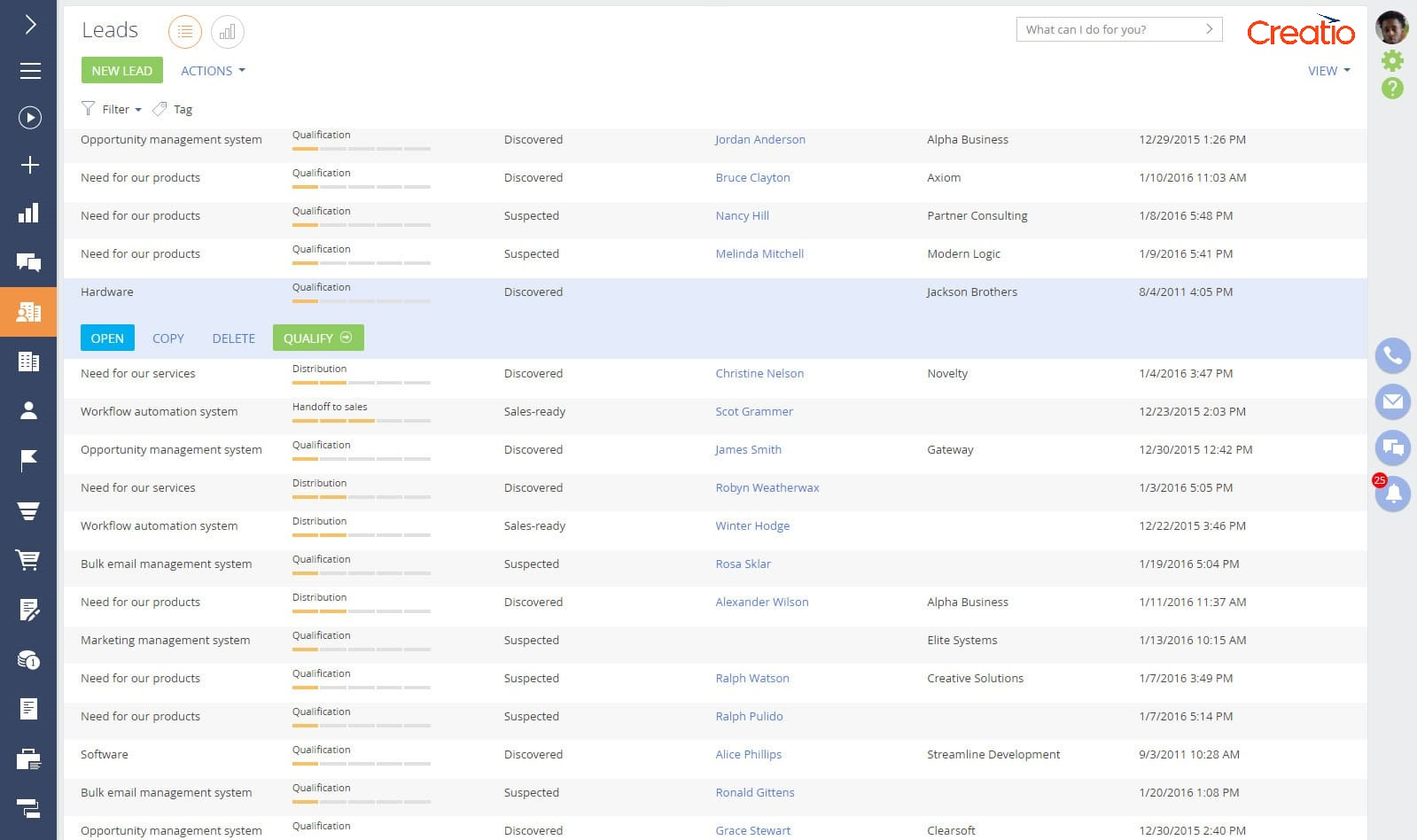
Company information
Are you interested in selling to companies of a certain size, type, or industry? Maybe you want to sell only to B2B organizations or B2C? Ask questions about the company on your landing page forms so that you can take points away from leads who are not relevant to your business.
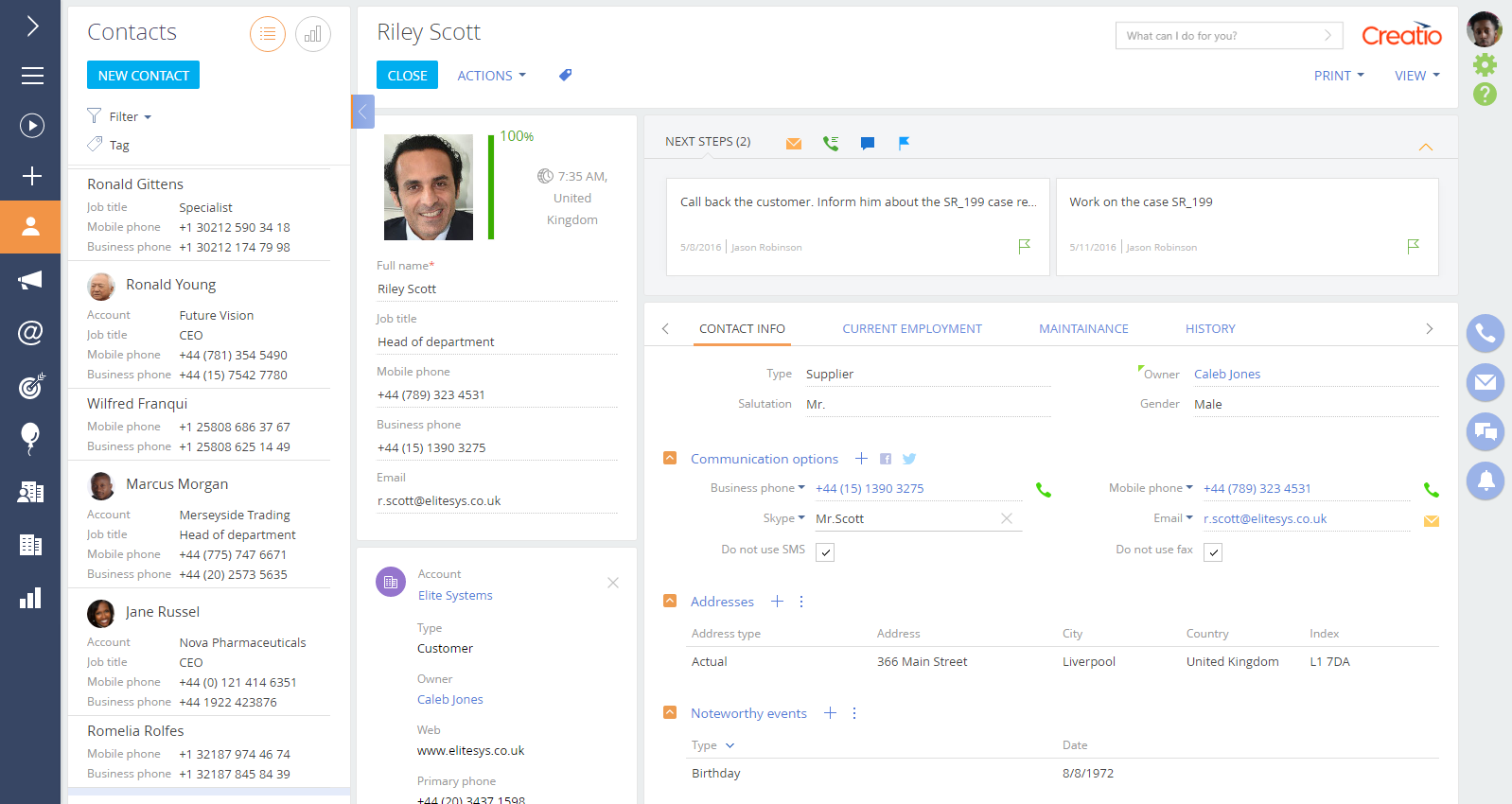
Online lead's behavior
This information shows the way a lead interacts with your website. Keep track of the leads who converted to customers: which and how many offers did they download, how many pages did they visit on your website before eventually becoming a customer, and so on.
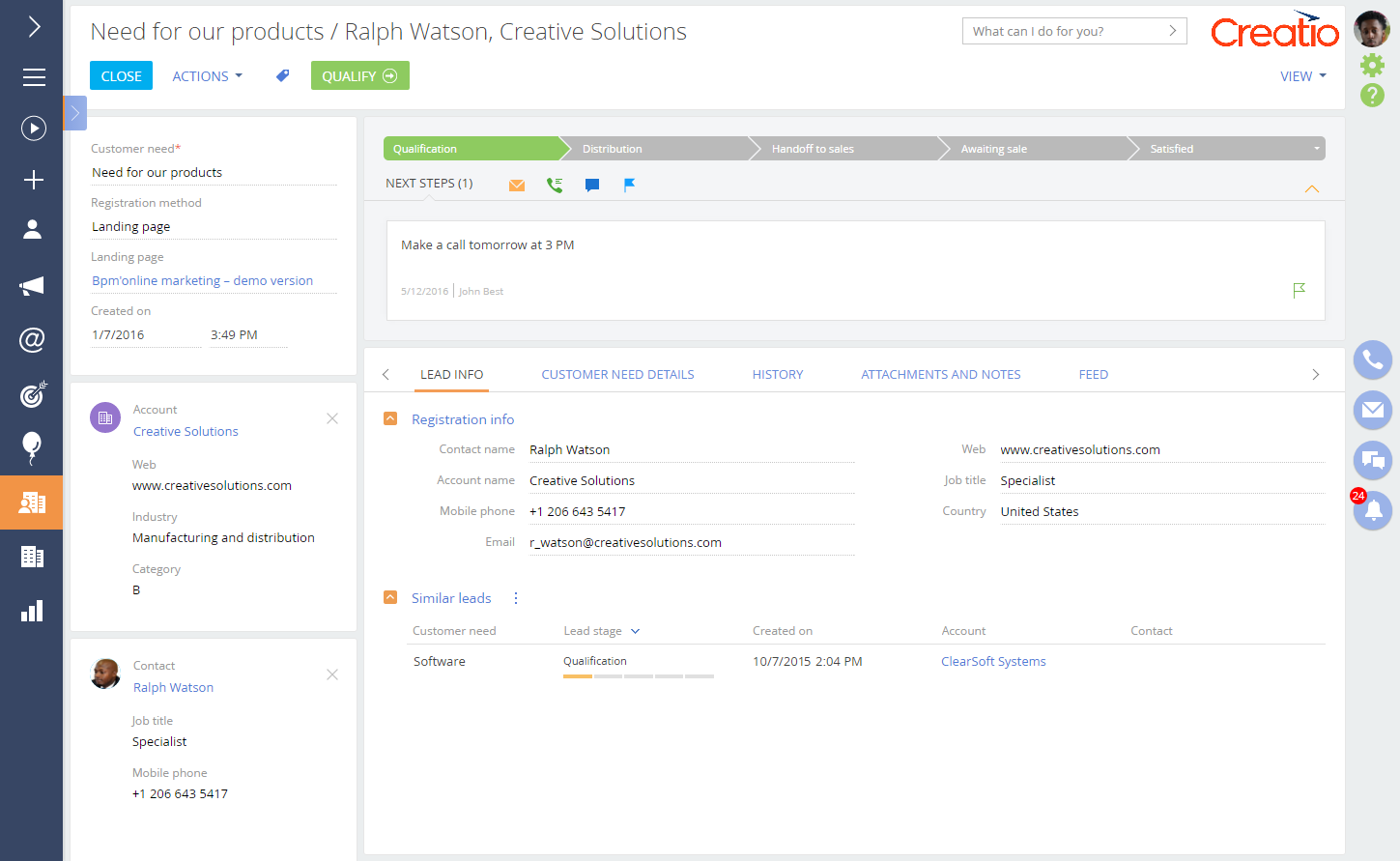
Email engagement
Signing up for a newsletter doesn’t mean that a lead is ready to buy your products or services. However, opening and clicking emails from your organization can give you a better idea of your leads’ interest level. You might also give higher lead scores to leads who click through on high-value emails, like demo offers and so on. The sales team will be especially interested in such prospects' behavior because that way, they can focus on the ones who seem most engaged.
The email engagement level is also useful information for the marketing team as it helps measure the effectiveness of campaigns and tailor future communications to better resonate with recipients. This data allows marketers to refine their marketing campaigns, improve engagement rates, and nurture leads more effectively through personalized interactions.
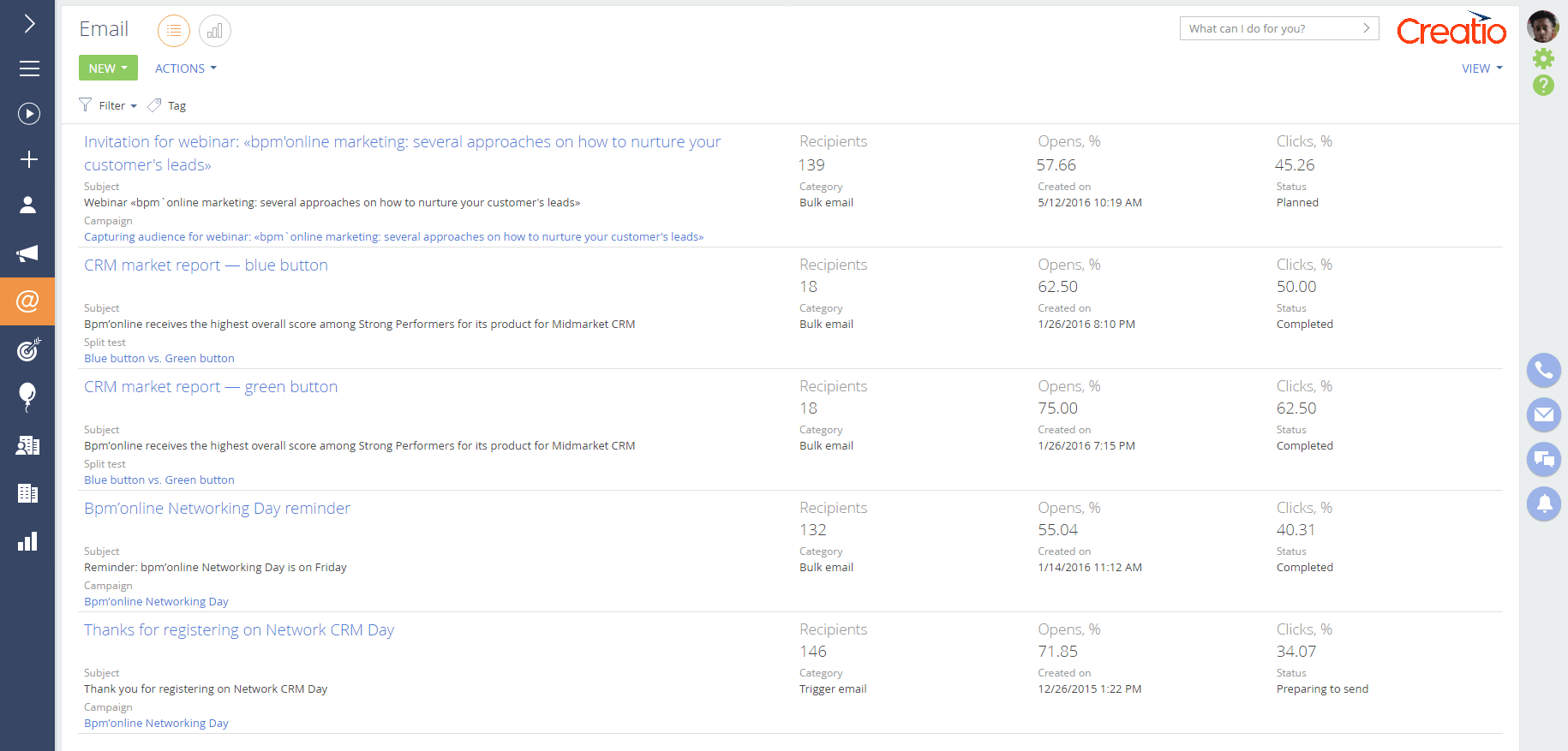
Social engagement
Social media engagement can also help better understand your leads’ behavior and interest in your product. Check how many times they clicked on your company's tweets and posts, and how many times they shared a post with their followers.
If your prospects are active on your social media channels, you may assign additional points to them. Nonetheless, you need to analyze their behavior on the channels that you consider the most important for your business.
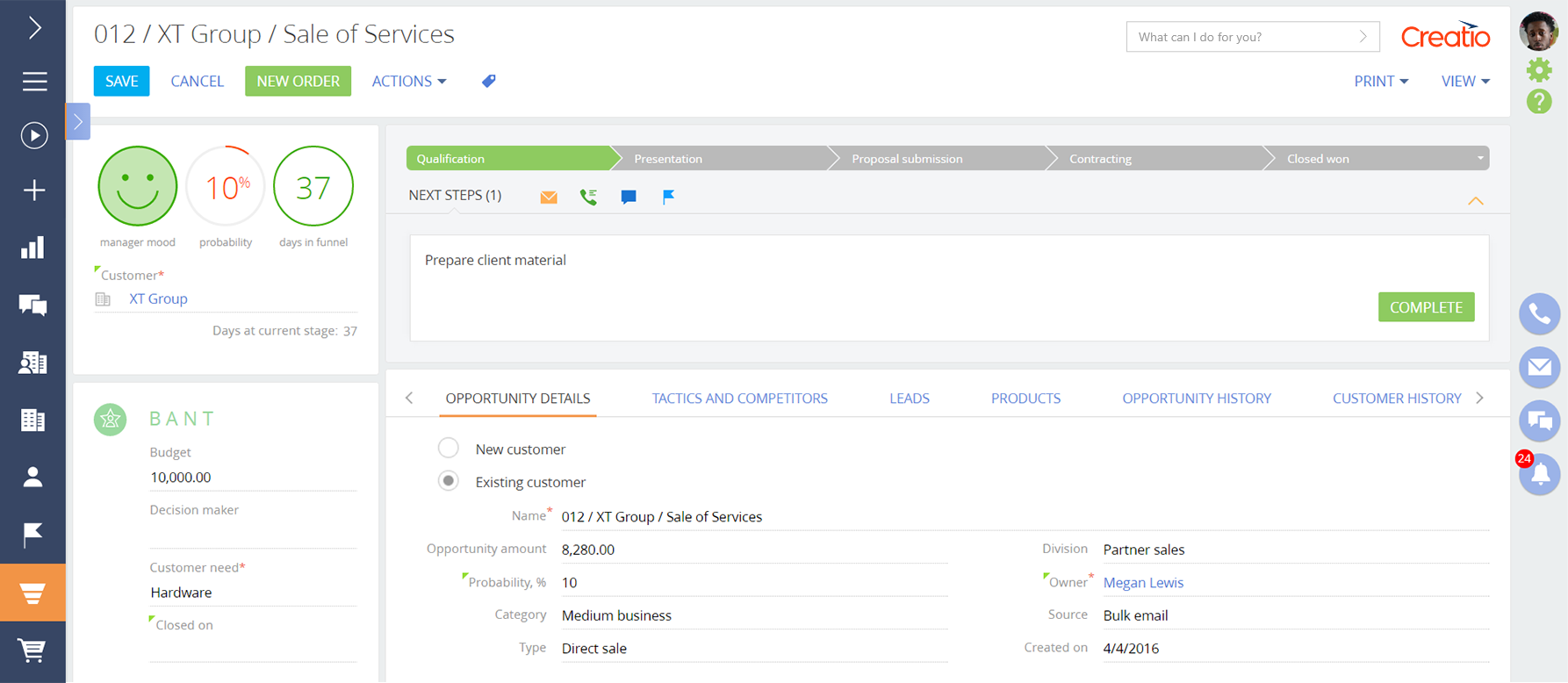
State of the market
Analyzing the state of the market is a crucial part of lead scoring. Understanding the expectations of potential customers, their focus, needs, opportunities, and the way they change can help predict your prospects’ behavior and understand them better. Pay attention to your market niche and keep track of how it changes over time.
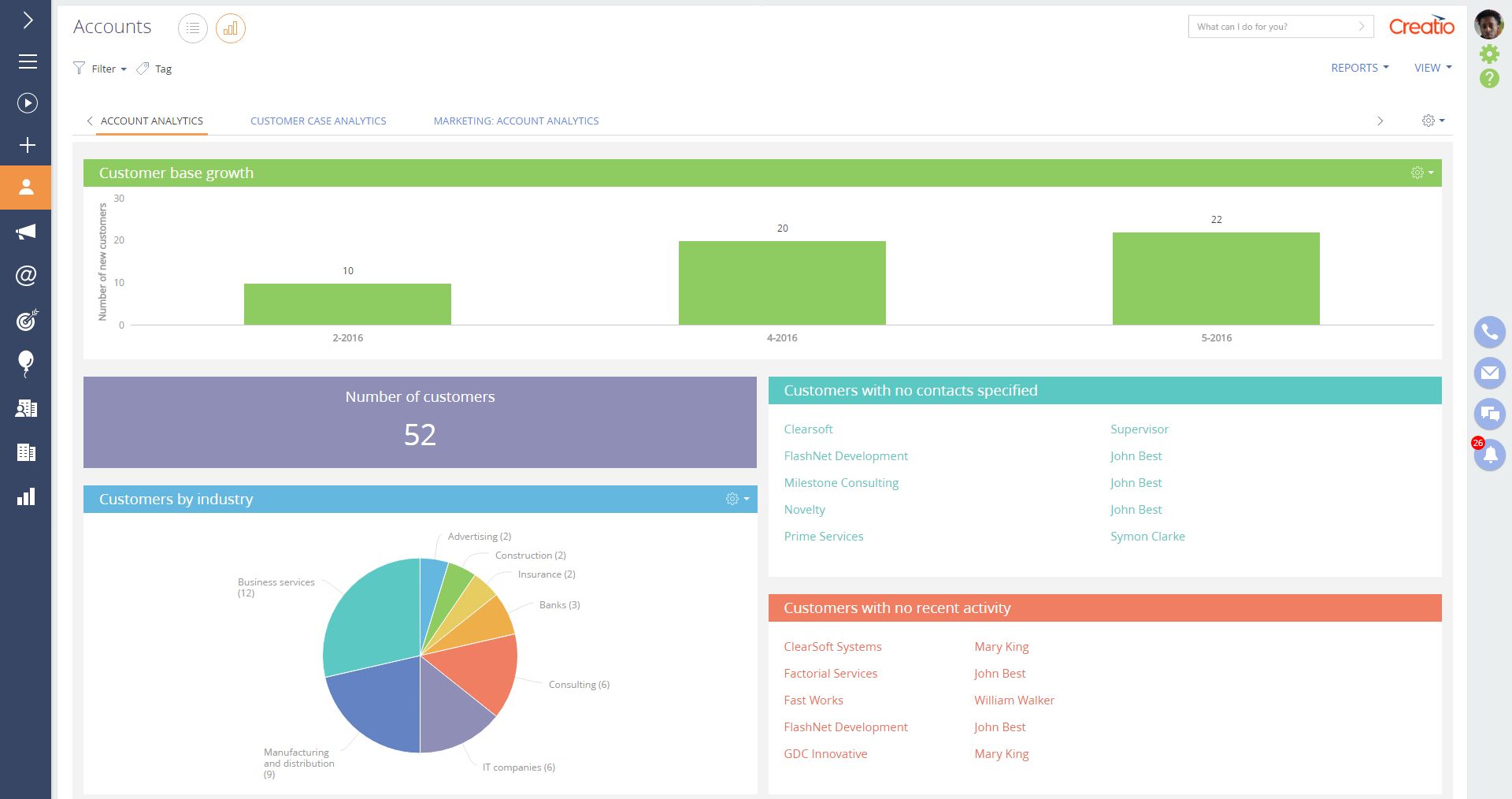
Lead scoring in Creatio
Creatio CRM is a comprehensive customer relationship management platform that enables businesses to manage and optimize their sales, marketing, and customer service processes.
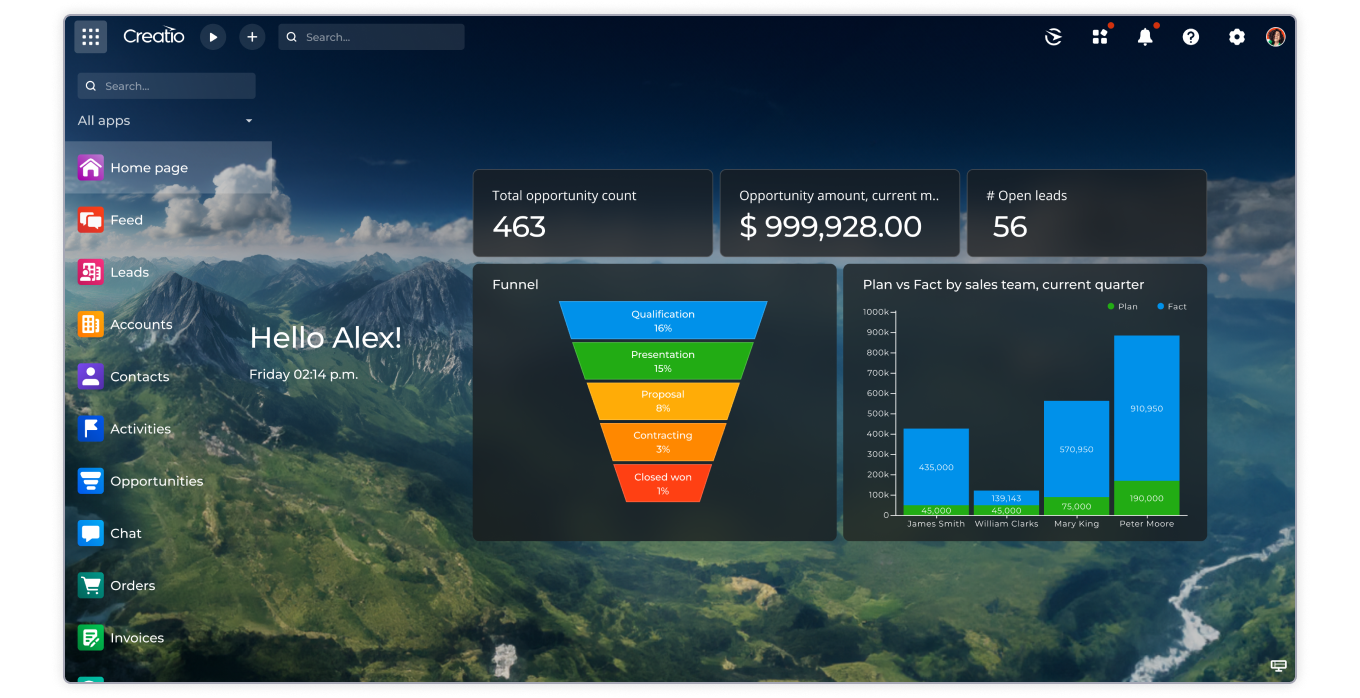
Creatio CRM's lead scoring functionality helps sales and marketing teams focus their efforts on leads that are most likely to convert, improving their productivity and increasing sales effectiveness. It offers customizable lead-scoring models that can be tailored to match specific business needs and objectives, streamlining lead prioritization. It also integrates advanced analytics and automation tools that enable businesses to assess lead quality more efficiently. Additionally, Creatio CRM's seamless integration with other CRM functionalities facilitates a holistic view of customer interactions, providing an extensive database with customers’ insights that help lead scoring models work more effectively.
Lead scoring in Creatio CRM not only evaluates and prioritizes leads based on various criteria but also streamlines the process by automatically routing qualified leads to the appropriate sales and marketing teams. This functionality ensures that high-potential leads receive timely and targeted engagement, enhancing the efficiency of lead conversion efforts.
Creatio CRM provides also predictive lead-scoring functionality with AI and advanced machine learning algorithms that analyze extensive datasets and predict the likelihood of leads converting into customers. By examining historical data and identifying patterns, this predictive model assigns scores to leads based on factors that are associated with successful conversions.
By leveraging Creatio CRM for lead scoring, businesses can optimize their sales processes, improve lead nurturing strategies, and achieve higher conversion rates. The platform's user-friendly interface and robust features make it a powerful tool for businesses looking to maximize their sales potential through intelligent lead management and data-driven decision-making.
Transform Tour Lead Management with Creatio CRM!

Maximize Your Sales Potential with Lead Scoring
Implementing a robust lead scoring system is crucial for optimizing sales and marketing departments' efforts. By accurately evaluating and prioritizing leads, businesses can allocate their resources more efficiently to enhance productivity and increase conversion rates, and revenue.
A successful lead-scoring system requires close collaboration between marketing professionals and sales reps to ensure alignment and consistency in evaluating leads. Proper setup, following the lead-scoring best practices, and continuous refinement are essential for maintaining an accurate and effective lead-scoring model. Additionally, investing in lead-scoring software like Creatio can further streamline your sales process thanks to advanced analytics and automation.
In summary, lead scoring is a strategic tool that can transform your sales process by providing actionable insights, improving lead management, and driving business success.




















































